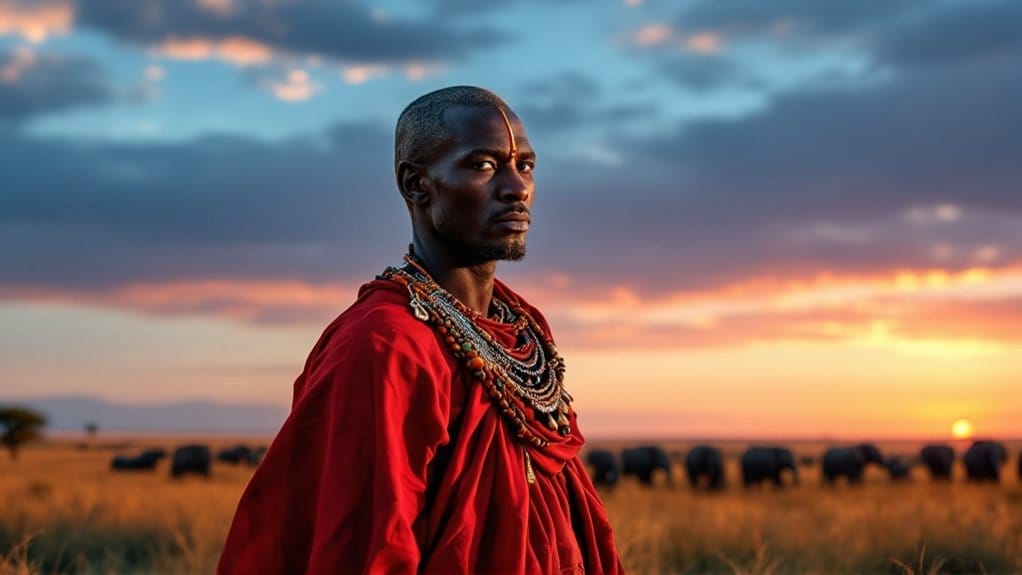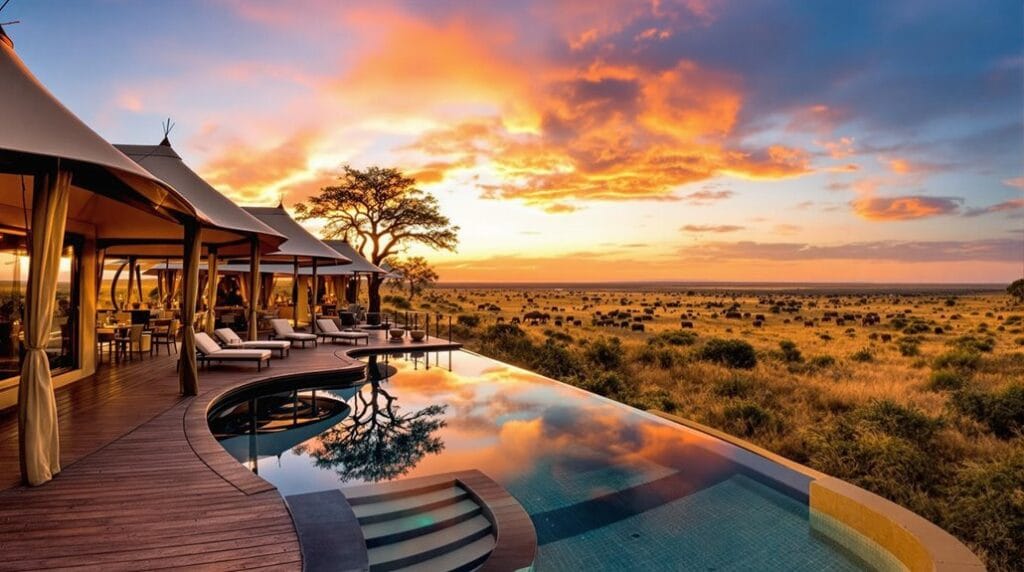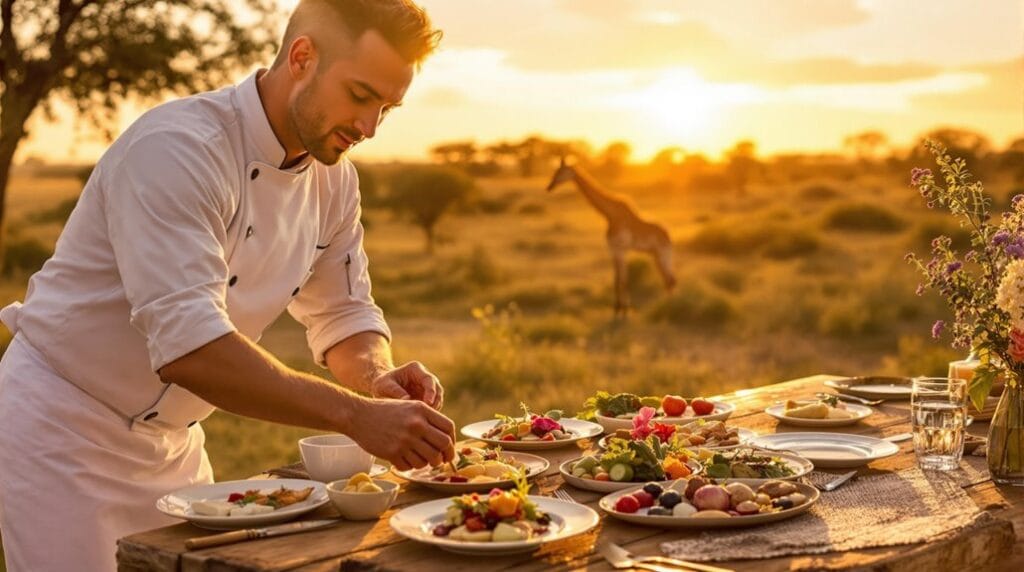African wildlife preservation matters immensely for cultural importance, as it anchors community identity and respect for tradition. Species symbolize strength and heritage, enriching folklore and rituals essential to spiritual life. Wildlife also fosters community cohesion through shared conservation goals, uniting people with a sense of purpose and collaboration. Additionally, preserving biodiversity supports both ecosystems and cultural narratives, ensuring the continuation of traditional practices. Engaging local youth in education cultivates awareness and stewardship, empowering them to protect their natural heritage. By truly understanding these crucial connections, you'll appreciate why wildlife preservation isn't just necessary—it's essential for cultural survival.
Key Takeaways
- Wildlife acts as cultural totems, reinforcing clan identities and pride within African communities.
- Rituals involving animals symbolize spiritual beliefs, emphasizing respect for wildlife and ancestral practices.
- Preserving wildlife supports traditional practices essential for maintaining cultural identity and community heritage.
- Community-led conservation projects empower locals, fostering unity and a shared commitment to preserving cultural and natural resources.
- Eco-tourism celebrates traditional practices linked to nature, generating income while strengthening cultural connections and wildlife stewardship.
Connection to Ancestral Heritage
Throughout history, African wildlife has been deeply intertwined with the continent's cultural identity and ancestral heritage. For many communities, this connection isn't just about nature; it's a fundamental aspect of who they are.
Species often symbolize clan identities, serving as totems that reinforce belonging and pride. These animals are woven into creation myths and folklore, reminding you of the importance of biodiversity in your cultural narratives.
Traditional customs reflect deep respect for wildlife, where rituals involving animals highlight the reverence for their role in ancestral practices.
When you engage in these ceremonies, you honor your ancestors, ensuring that their legacies endure. Wildlife preservation becomes a way not only to protect these creatures but to safeguard your heritage for future generations.
Spiritual Significance in Rituals
In many African cultures, rituals involving wildlife are far more than mere traditions; they embody profound spiritual beliefs that shape communal identity.
You'll find that animals like elephants and lions symbolize crucial values such as strength and wisdom, reinforcing their role in both worship and social cohesion.
As you explore these practices, consider how the preservation of these species is essential not only for biodiversity but also for maintaining the rich tapestry of cultural heritage and spiritual significance in these communities.
Ritual Practices and Beliefs
Many communities in Africa regard animals as sacred beings, weaving their presence deeply into the fabric of spiritual beliefs and rituals. In these cultures, ritual practices often involve animal sacrifices during significant life events like births, marriages, and funerals. These acts aren't merely about sustenance; they're crucial expressions of respect and gratitude toward ancestors and the spiritual world.
Certain species, such as elephants and lions, hold particular significance, symbolizing strength, wisdom, and protection. You'll find them featured prominently in traditional ceremonies, highlighting the deep connection between wildlife and community identity.
This relationship reflects a rich cultural heritage, where the act of sacrifice fosters harmony with nature and honors the ecosystem that sustains life.
As you consider the importance of wildlife conservation, remember that the preservation of these animals is essential for maintaining these cultural practices. The loss of species can lead to the erosion of traditional beliefs and practices, fundamentally impacting community cohesion and identity.
Symbolism in Cultural Identity
The connection between wildlife and cultural identity runs deep, especially as certain animals embody powerful symbols within African communities. For many, wildlife isn't merely part of the ecosystem; it holds profound cultural significance. Animals like elephants and lions symbolize strength, wisdom, and protection, weaving themselves into the very fabric of cultural narratives.
During significant life events such as weddings and funerals, spiritual rituals often involve animal sacrifices, reflecting enduring beliefs that honor ancestors and the divine.
You'll find that traditional practices surrounding wildlife preservation are essential for maintaining community identity. In pastoral communities like the Maasai, preserving these majestic creatures is integral to their way of life, reinforcing a sense of belonging and continuity.
The rituals that involve wildlife not only serve spiritual purposes but also strengthen social bonds, emphasizing the interconnectedness of cultural identity and nature.
In this light, wildlife preservation becomes more than an ecological concern; it's a cornerstone of cultural identity. Understanding this relationship invites you to appreciate the depth of these traditions and the urgent need to protect the animals that symbolize so much within African heritage.
Promoting Community Cohesion
While engaging in wildlife preservation efforts, communities often find themselves united by a common purpose, strengthening their social fabric. This shared commitment fosters community cohesion as local populations collaborate on conservation efforts. When you participate in these initiatives, you're not just protecting wildlife; you're also reinforcing cultural traditions that celebrate your connection to nature.
Rituals and festivals centered around animals deepen social bonds, creating a vibrant tapestry of shared heritage. Moreover, preserving wildlife habitats can lead to sustainable livelihoods through ecotourism, bringing economic benefits that enhance community ties.
As you work together to protect your natural resources, you'll find that communal support systems grow stronger. Collaborative conservation projects empower local communities by involving you in decision-making processes, instilling a sense of ownership and responsibility towards your environment.
Education and awareness programs play an essential role here, enhancing your understanding and appreciation of local ecosystems. This knowledge fosters collaboration and solidarity among community members, making wildlife preservation not just an ecological necessity but a cultural imperative.
In embracing these initiatives, you contribute to a united front that champions both your heritage and the natural world, creating a legacy of mutual respect and care.
Biodiversity and Ecosystem Health
Understanding the intricate web of biodiversity in Africa reveals just how significant it is for ecosystem health. As one of the most biodiverse continents, Africa boasts an estimated 1,100 mammal species, 2,600 bird species, and 20,000 plant species. This rich biodiversity is essential not only for wildlife populations but also for the cultural significance it holds for local communities.
Healthy ecosystems support crucial processes like pollination and climate regulation, which benefit both human and wildlife populations. In this way, conserving biodiversity directly enhances ecosystem health.
| Ecosystem Service | Importance to Wildlife | Importance to Humans |
|---|---|---|
| Pollination | Supports plant reproduction | Guarantees food production |
| Nutrient Cycling | Maintains soil health | Fertile land for agriculture |
| Climate Regulation | Stabilizes habitats | Mitigates climate impacts |
| Water Purification | Provides clean water | Critical for health |
The loss of biodiversity threatens these essential services and the cultural ties African communities have with their environment. By prioritizing conservation, you're not just protecting wildlife; you're preserving a way of life that's deeply intertwined with the land and its natural heritage.
Cultural Narratives and Storytelling
Cultural narratives and storytelling in Africa weave a rich tapestry that connects communities with their natural surroundings, particularly wildlife. These narratives are more than mere tales; they embody the core of traditional African culture, highlighting the intricate relationships between people and animals. Through storytelling, elders pass down essential lessons about wildlife conservation, emphasizing respect for nature and the importance of sustainable coexistence.
Take the Maasai, for instance. Their stories about lions symbolize bravery and strength, while also addressing the real challenges of human-wildlife conflict. This duality fosters a deeper understanding of wildlife's role in their ecosystem.
Festivals and ceremonies, rich with wildlife themes, showcase traditional dances and songs that educate younger generations about the animals that share their land.
These oral traditions not only preserve cultural practices but also cultivate a sense of stewardship within communities. By recognizing that these animals are integral to their cultural heritage, people feel a stronger connection to wildlife conservation efforts.
Fundamentally, storytelling isn't just about preserving the past; it's an essential tool for nurturing a future where both African culture and wildlife can thrive together.
Economic Benefits From Ecotourism
The rich cultural narratives that celebrate Africa's wildlife also underscore the significant economic benefits that arise from ecotourism. This thriving sector generates approximately $34 billion annually, channeling resources directly into local communities and conservation efforts. When you participate in wildlife tourism, you're not just an observer; you're contributing to job creation for over 3 million people across the continent, fostering economic stability and reducing poverty.
| Economic Impact | Description |
|---|---|
| Revenue Generation | $34 billion annually supports communities |
| Job Creation | Over 3 million jobs linked to ecotourism |
| Biodiversity Maintenance | Parks protect endangered species and ecosystems |
| Elephant Value | Each generates up to $1.6 million in its lifetime |
Preservation of Traditional Practices
When you consider the preservation of traditional practices in Africa, you're looking at a crucial thread in the fabric of cultural identity.
These practices, rooted in traditional ecological knowledge, not only honor the relationship between communities and wildlife but also guarantee the transmission of values across generations.
Cultural Identity Preservation
Wildlife isn't just a backdrop to the lives of many African communities; it's deeply woven into their cultural fabric. The connection between wildlife and cultural identity is profound, as traditional practices often depend on the presence of specific species. You might feel the pulse of this relationship in the following ways:
- Rituals and Ceremonies: Many communities rely on animal presence for ancestral worship, where wildlife plays an integral role in celebrating their heritage.
- Cultural Significance: For groups like the Maasai, the reverence for lions and cattle reinforces their identity and traditions, binding them to their land.
- Sustaining Traditional Knowledge: The unique understandings of animal behavior passed down through generations enrich the cultural landscape, fostering a sense of belonging.
When wildlife conservation prioritizes these cultural values, it not only helps maintain traditional practices but also guarantees that communities thrive in harmony with their environment.
Conversely, threats to wildlife jeopardize not just biodiversity but the very essence of these communities. Recognizing the cultural significance of wildlife is essential for preserving the rich tapestry of traditions that define African identity.
Traditional Ecological Knowledge
Understanding the interplay between cultural identity and wildlife leads us to appreciate the role of Traditional Ecological Knowledge (TEK) in preserving both nature and heritage. TEK embodies the wisdom of indigenous and local communities, passed down through generations, shaping sustainable practices that emphasize our connection to wildlife and ecosystems.
By integrating TEK into wildlife preservation efforts, you not only enhance biodiversity conservation but also foster a deeper sense of belonging within your community.
Through TEK, you gain insights into indigenous species and their ecological roles, helping protect essential wildlife habitats. This knowledge is critical for maintaining ecosystem health and resilience against environmental changes.
Additionally, the preservation of traditional practices safeguards cultural heritage, guaranteeing that the stories and customs of your ancestors live on.
Modern conservation strategies that incorporate TEK have proven more effective, as they leverage local knowledge about animal behaviors and ecosystem dynamics.
Education and Awareness Initiatives
Countless education and awareness initiatives across Africa are essential for fostering a deep understanding of wildlife conservation.
These efforts not only highlight the importance of biodiversity but also empower communities to take action. When you engage with these programs, you become part of a larger movement, understanding that every species plays a crucial role in our ecosystem.
- Community Engagement: Local populations are actively involved in conservation, nurturing a sense of belonging and responsibility for their natural heritage.
- Youth Education: Schools increasingly incorporate wildlife education, teaching children about sustainable practices and the significance of protecting wildlife.
- Workshops and Outreach: NGOs conduct workshops that inform communities about the ecological and economic benefits of preservation, creating a ripple effect of awareness.
Fostering Global Cultural Appreciation
The intricate relationship between African wildlife and local cultures fosters a profound appreciation that transcends borders. This connection embodies the cultural significance of over 3,000 ethnic groups, each possessing unique traditions intertwined with their environment and wildlife. Iconic species like elephants and lions not only enrich local narratives but also symbolize Africa's biodiversity, drawing international attention and support for conservation efforts.
As you explore African cultures, you'll find that artistic expressions—music, dance, and visual arts—often draw inspiration from wildlife, showcasing the deep-rooted connection between nature and human creativity. This interplay enhances global appreciation for African cultures and highlights the significance of wildlife conservation.
Moreover, wildlife conservation initiatives create opportunities for cultural exchange and understanding. When you engage in ethical tourism and participate in programs supporting local communities, you contribute to preserving traditional practices that are essential to local ecosystems.
Empowerment of Local Communities
When you empower local communities through wildlife preservation, you open up sustainable livelihood opportunities that resonate with their cultural heritage.
By actively participating in conservation initiatives, these communities not only protect their environment but also enhance their economic prospects.
Community-led projects showcase the profound connection between culture and nature, highlighting how traditional practices can thrive alongside modern conservation efforts.
Sustainable Livelihood Opportunities
Empowering local communities through sustainable wildlife preservation opens up a wealth of economic opportunities that can transform lives. By embracing sustainable livelihood opportunities, communities can foster a sense of belonging while enhancing their local economies. The integration of traditional knowledge with modern conservation practices not only preserves cultural identity but also actively involves locals in decision-making processes.
Consider these impactful benefits:
- Job Creation: Ecotourism generates numerous job opportunities, providing alternative livelihoods that reduce dependency on unsustainable practices.
- Community Development: Revenues from national parks support local schools and healthcare facilities, considerably improving quality of life for families.
- Skill Development: Training programs in wildlife photography and guided tours equip locals with valuable skills, ensuring they can thrive economically through wildlife preservation.
Through community-based conservation, you can become stewards of natural resources, ensuring that the land and wildlife thrive for future generations.
Cultural Heritage Preservation
Preserving cultural heritage through wildlife conservation not only strengthens community ties but also enriches the identity of local populations. When local communities engage in eco-tourism, they not only generate income but also celebrate their traditional practices and cultural significance tied to the land and its wildlife. This empowerment fosters a sense of belonging, as community-led conservation projects allow for the maintenance of intergenerational knowledge transfer, ensuring that the wisdom of ancestors is shared with future generations.
| Benefits of Cultural Heritage Preservation | Examples |
|---|---|
| Strengthens community ties | Shared rituals and festivals |
| Promotes economic opportunities | Eco-tourism ventures |
| Maintains traditional ecological knowledge | Sustainable farming practices |
| Encourages stewardship and responsibility | Local wildlife management |
Community-Led Conservation Initiatives
Community-led conservation initiatives play an essential role in fostering local empowerment through active involvement in wildlife management. When you engage in these efforts, you're not just preserving wildlife; you're also embracing the rich traditional knowledge of your community.
Integrating this wisdom into sustainable development strategies guarantees that both people and nature thrive together.
Here are three powerful reasons to support these initiatives:
- Ownership: By participating, you cultivate a sense of responsibility towards your environment, fostering long-term commitment to wildlife preservation.
- Economic Opportunity: Community-led initiatives often lead to eco-tourism, providing crucial income streams and reducing reliance on destructive practices.
- Capacity Building: Education and training enhance your skills, empowering you to advocate for your rights and manage your natural resources effectively.
Programs, like community conservancies in Kenya, illustrate that when locals are granted rights to wildlife resources, poaching rates decrease, and wildlife populations flourish.
Join these efforts, and be part of a transformative movement that celebrates cultural heritage while guaranteeing a sustainable future for generations to come. Your involvement can make a profound difference!
Frequently Asked Questions
Why Are Animals Important in African Culture?
Animals embody spiritual symbolism and enrich your community identity through traditional practices and storytelling heritage. They maintain ecological balance, connecting you to ancestral roots and fostering a sense of belonging within your culture and environment.
Why Is African Wildlife Important?
African wildlife's essential for biodiversity significance and ecosystem balance. You'll discover economic benefits through tourism, while upholding traditional knowledge and embracing ethical responsibility. Protecting these creatures fosters a sense of belonging, connecting you to nature's legacy.
Why Is Conservation Important in Africa?
Conservation in Africa's essential for ecological balance. You'll see how community involvement and sustainable practices enhance biodiversity protection, ensuring not just wildlife survival, but also enriching local cultures and economies through responsible conservation efforts.
How Has African Culture Influenced the World?
African culture's vibrant art, rich oral traditions, and deep-rooted community rituals have shaped global perspectives. Traditional beliefs and spiritual symbolism resonate worldwide, creating connections that foster understanding, appreciation, and a sense of belonging across diverse cultures.
Conclusion
In preserving African wildlife, you're not just protecting animals; you're safeguarding a vibrant tapestry of culture and identity. Every species holds a story, every ecosystem whispers secrets of our ancestors. By valuing this connection, you empower local communities and foster a deeper understanding of our shared heritage. As you champion wildlife preservation, remember: you're not merely a spectator; you're an essential part of a legacy that enriches us all. Together, let's guarantee these cultural treasures thrive for generations to come.









